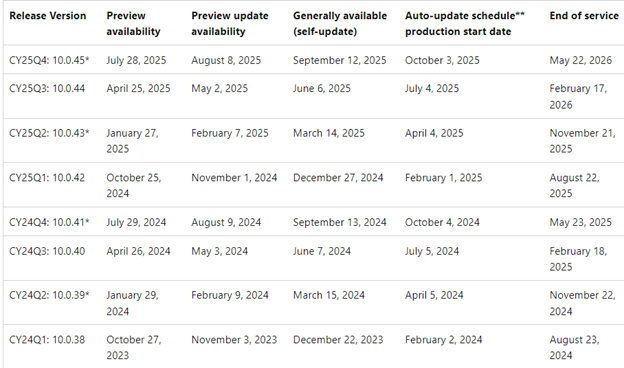Back in 2018, Microsoft released the Continuous Update policy for Dynamics 365 Finance & Supply Chain Management (D365 FSCM), which included seven service updates per year. Announced late September 2023, Microsoft is reducing the number of service updates released per year to four. Here’s what to expect with these upcoming D365 FSCM release schedule changes.
New Release Schedule
Major releases, previously known as the Spring and Fall updates, will shift to January and July, with minor updates in April and October. Major releases will be denoted on version numbers with a “*”, e.g., “CY25Q2: 10.0.43*”.
The new naming convention will also be introduced at the same time. The update name will consist of two segments. The first will denote the year and quarter the update is scheduled to automatically be applied to production environments. The second segment will be the update version. For example, “CY24Q1: 10.0.38” is version 10.0.38 that will be automatically applied to production from the first quarter of 2024 onwards.
You will now be able to pause only one consecutive update instead of three. The total minimum number of updates you are required to take per year remains at two. The management of updates—pausing, scheduling, and deploying to sandboxes—is still through LCS, as described here: https://learn.microsoft.com/en-us/dynamics365/fin-ops-core/dev-itpro/lifecycle-services/pause-service-updates?context=%2Fdynamics365%2Fcontext%2Fcommerce
Upcoming Release Schedule

Clients and Partners will retain the ability to preview releases under the First Release program. Sign ups are available here: https://customervoice.microsoft.com/Pages/ResponsePage.aspx?id=v4j5cvGGr0GRqy180BHbRz1jX3aguexFhrayrCqbncVUMFBLOFg5SzlFUjI1R1dWV1ZINDVGWEFERyQlQCN0PWcu
Proactive Quality Updates Schedule
Proactive Quality Updates (PQUs) will remain unchanged. These will be pushed in between service updates, delivering periodic cumulative hotfixes. The PQUs will follow the same “safe-deployment” model, which first delivers the PQUs to a single region that contains a small group of customers who have the highest tolerance for risk. Then, if no regressions are identified, the process continues through a broader group of customers, based on geographies (stations), until all customers are using the new version.
You can learn more about PQUs here: https://learn.microsoft.com/en-us/dynamics365/fin-ops-core/dev-itpro/get-started/quality-updates?context=%2Fdynamics365%2Fcontext%2Fcommerce
Have any questions about the D365 FSCM release schedule changes? Don’t hesitate to reach out to one of our Dynamics 365 experts at any time!
This publication contains general information only and Sikich is not, by means of this publication, rendering accounting, business, financial, investment, legal, tax, or any other professional advice or services. This publication is not a substitute for such professional advice or services, nor should you use it as a basis for any decision, action or omission that may affect you or your business. Before making any decision, taking any action or omitting an action that may affect you or your business, you should consult a qualified professional advisor. In addition, this publication may contain certain content generated by an artificial intelligence (AI) language model. You acknowledge that Sikich shall not be responsible for any loss sustained by you or any person who relies on this publication.









